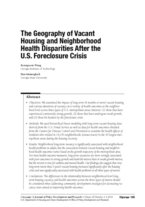0
Interactive
Community:
The Legal Bibliography is collection of 100+ papers, toolkits and other materials focused on privacy, consent and policy documentation. Co-developed by the Network for Public Health Law and Data Across Sectors for Health (DASH), the Bibliography is a growing resource for lawyers and community data practitioners, intended to support local collaboratives in their efforts to share data across sectors.
Authored by: Data Across Sectors for Health (DASH) and Network for Public Health Law (NPHL)
Topics: Criminal justice, Data sharing, Education, Health, Homelessness, Housing, Mental health, Partnerships, Safety
 Shared by Housing Is
Shared by Housing Is
Housing Is posted a
on Apr 8, 2019
Data Across Sectors for Health (DASH) and Network for Public Health Law (NPHL)
The Legal Bibliography is collection of 100+ papers, toolkits and other materials focused on privacy, consent and policy documentation.
0
Research
Community:
Feb 5, 2019
Housing is considered a social determinant of health, with poor housing conditions being associated with poor health. Veterans with disabilities are more likely to experience a housing crisis because of combat experiences and employment instability. We identified facilitators and barriers to finding and maintaining rental housing. We sought to understand the housing needs of Veterans with military-related disabilities using the biopsychoecological model (BEM) as an organizing framework.
Authored by: Semeah, Ahrentzen, Cowper-Ripley, Santos-Roman, Beamish, and Farley for Housing Policy Debate
Topics: Disabilities, Funding, Health, Homelessness, Housing, Legislation & Policy, Research, Safety, Seniors, Stability
 Shared by Housing Is
Shared by Housing Is
Housing Is posted a
on Mar 14, 2019
Semeah, Ahrentzen, Cowper-Ripley, Santos-Roman, Beamish, and Farley for Housing Policy Debate
Housing is considered a social determinant of health, with poor housing conditions being associated with poor health. Veterans with disabilities are more likely to experience a housing crisis because of combat experiences and employment instability.
0
Research
Community:
Nov 1, 2018
In this study, researchers conduct a literature review across public health, environmental health, medical, sociology, and urban planning journals to synthesize the research on the mental health effects of rat infestations on residents living in urban neighborhoods.
Authored by: Kaylee Byers, Chelsea G. Himsworth, and Raymond Lam for The Journal of Environmental Health
Topics: Health, Housing, Low-income, Mental health, Research, Safety
 Shared by Housing Is
Shared by Housing Is
Housing Is posted a
on Feb 28, 2019
Kaylee Byers, Chelsea G. Himsworth, and Raymond Lam for The Journal of Environmental Health
In this study, researchers conduct a literature review across public health, environmental health, medical, sociology, and urban planning journals to synthesize the research on the mental health effects of rat infestations on residents living in urban neighborhoods.
0
Research
Community:
Sep 1, 2018
Systematic analysis of health care complaints can improve quality and safety by providing patient-centered insights that localize issues and shed light on difficult-to-monitor problems.
Authored by: Alex Gillespie and Tom Reader for Milbank Memorial Fund
Topics: Health, Research, Safety
 Shared by Mica O'Brien
Shared by Mica O'Brien
Mica O'Brien posted a
on Jan 24, 2019
Alex Gillespie and Tom Reader for Milbank Memorial Fund
Systematic analysis of health care complaints can improve quality and safety by providing patient-centered insights that localize issues and shed light on difficult-to-monitor problems.
0
Research
Community:
Sep 1, 2018
This article shows how a complex systems perspective may be used to analyze the commercial determinants of noncommunicable diseases (NCDs), and it explains how this can help with (1) conceptualizing the problem of NCDs and (2) developing effective policy interventions.
Authored by: Milbank Memorial Fund
Topics: Health, Partnerships, Research, Safety
 Shared by Mica O'Brien
Shared by Mica O'Brien
Mica O'Brien posted a
on Jan 24, 2019
This article shows how a complex systems perspective may be used to analyze the commercial determinants of noncommunicable diseases (NCDs), and it explains how this can help with (1) conceptualizing the problem of NCDs and (2) developing effective policy interventions.
0
Interactive
Community:
Jan 1, 2019
A collection of resources that cover public health issues such as dental care, diabetes, vaccines, and nutrition.
Authored by: Mark Barna for The Nation's Health
Topics: Child welfare, Health, Low-income, Safety
 Shared by Mica O'Brien
Shared by Mica O'Brien
Mica O'Brien posted a
on Jan 7, 2019
Mark Barna for The Nation's Health
A collection of resources that cover public health issues such as dental care, diabetes, vaccines, and nutrition.
0
Research
Community:
May 16, 2018
Treating opioid use disorder among homeless families can reduce hepatitis C transmission, infant drug withdrawal, and overdose, which is the leading cause of death among people experiencing homelessness. Although office-based treatment is effective for homeless patients, homelessness (especially among families) creates barriers to office-based opioid treatment, such as stigma, child care needs, or distance from an office site. To reduce barriers to treatment, the Family Team at the Boston Health Care for the Homeless Program added a shelter-based opioid treatment program to its outreach clinic at a family homeless shelter and motel. The Family Team consists of a physician, a nurse, two case managers, and a behavioral health clinician.
Authored by: American Public Health Association
Topics: Health, Homelessness, Housing, Place-based, Preventative care, Safety, Stability, Substance abuse
 Shared by Mica O'Brien
Shared by Mica O'Brien
Mica O'Brien posted a
on Nov 21, 2018
American Public Health Association
Treating opioid use disorder among homeless families can reduce hepatitis C transmission, infant drug withdrawal, and overdose, which is the leading cause of death among people experiencing homelessness.
0
Interactive
Community:
Resources for integrating resiliency, hope, and wellness in schools
Authored by: Treatment and Services Adaptation Center
Topics: Child welfare, Low-income, Partnerships, Place-based, Research, Safety
 Shared by Mica O'Brien
Shared by Mica O'Brien
Mica O'Brien posted a
on Nov 19, 2018
Treatment and Services Adaptation Center
Resources for integrating resiliency, hope, and wellness in schools
0
Interactive
Community:
Nov 14, 2018
After decades of sprawl and suburban dominance, U.S. cities are experiencing rebounding populations, growing employment, and new public and private sector investments in places that are walkable, transit-oriented, and support diverse people and amenities. But we know that the benefits of these trends are not equally distributed, presenting an urgent opportunity for local and regional leaders to advance place-led development that produces better economic outcomes for more people in more places.
To help deliver on that imperative, the Metropolitan Policy Program at Brookings launched the Anne T. and Robert M. Bass Center for Transformative Placemaking (“Bass Center”) with an event on Wednesday, November 14. In collaboration with Project for Public Spaces (PPS) and the National Main Street Center (NMSC), the Bass Center will inspire public, private, and civic sector leaders to make transformative place investments that generate widespread social and economic benefits. Brookings President John Allen, Bass Center Director and Senior Fellow Jennifer Vey, special guest speaker Carol Coletta, and a distinguished panel of experts discussed how market and demographic trends are driving new demands for placemaking that benefit more people and places.
Authored by: The Brookings Institution
Topics: Community development, Housing, Partnerships, Place-based, Safety, Stability
 Shared by Mica O'Brien
Shared by Mica O'Brien
Mica O'Brien posted a
on Nov 19, 2018
The Brookings Institution
After decades of sprawl and suburban dominance, U.S. cities are experiencing rebounding populations, growing employment, and new public and private sector investments in places that are walkable, transit-oriented, and support diverse people and amenities.
0
Research
Community:
Oct 18, 2018
In this report, we examine how housing code enforcement in Memphis, Tennessee, could prioritize public health as a key outcome and better coordinate with public health agencies, community health nonprofits, and other health care institutions. We use both qualitative and quantitative data collection and analysis to explore how housing code enforcement works and how it might expand to address public health as a key outcome.
Authored by: Urban Institute
Topics: Health, Place-based, Research, Safety
 Shared by Mica O'Brien
Shared by Mica O'Brien
Mica O'Brien posted a
on Nov 7, 2018
In this report, we examine how housing code enforcement in Memphis, Tennessee, could prioritize public health as a key outcome and better coordinate with public health agencies, community health nonprofits, and other health care institutions.
0
Interactive
Community:
Nov 5, 2018
Content for this app was developed specifically for middle schoolers and educates them on the principles of a healthy home in a preteen-friendly format. Navigation is simple and intuitive. Interactive features include the Train the Brain and the ability to save a list of items found in their home. Colorful graphics highlight many different hazards that can occur in homes, such as lead, mold and moisture, pests, and more.
Authored by: HUD
Topics: Child welfare, Health, Healthy homes, Housing, Lead, Low-income, Place-based, Safety, Youth
 Shared by Mica O'Brien
Shared by Mica O'Brien
Mica O'Brien posted a
on Nov 5, 2018
Content for this app was developed specifically for middle schoolers and educates them on the principles of a healthy home in a preteen-friendly format. Navigation is simple and intuitive. Interactive features include the Train the Brain and the ability to save a list of items found in their home.
0
Interactive
Community:
Oct 26, 2018
Percent of Families with Children Eligible for Shelter Due to Domestic Violence, by Community District (July 2014–December 2015)
Authored by: Institute for Children, Poverty, and Homelessness
Topics: Child welfare, Domestic violence, East Coast, Homelessness, Housing, Low-income, Research, Safety
 Shared by Mica O'Brien
Shared by Mica O'Brien
Mica O'Brien posted a
on Oct 29, 2018
Institute for Children, Poverty, and Homelessness
Percent of Families with Children Eligible for Shelter Due to Domestic Violence, by Community District (July 2014–December 2015)
1
Research
Community:
Aug 1, 2018
We examined the impact of long-term (6 months or more) vacant housing and various durations of vacancy on a variety of health outcomes at the neighborhood level across three types of U.S. metropolitan areas (metros): (1) those that have experienced consistently strong growth, (2) those that have undergone weak growth, and (3) those hit hardest by the foreclosure crisis
Authored by:
Topics: Asset building, Asthma, Community development, Health, Housing, Low-income, Mental health, Metrics, Research, Safety, Transportation
 Shared by Housing Is
Shared by Housing Is
Housing Is posted a
on Aug 1, 2018
We examined the impact of long-term (6 months or more) vacant housing and various durations of vacancy on a variety of health outcomes at the neighborhood level across three types of U.S.
0
Research
Community:
Jul 23, 2018
The first two brief sections set the policy context for the ongoing housing policy debate on the social benefits of housing. Next is a five-section critical review of the last roughly quarter century of housing policy research. This is followed by a discussion of outstanding measurement issues before the concluding section.
Authored by:
Topics: Cost effectiveness, Health, Housing, Legislation & Policy, Low-income, Research, Safety
 Shared by Housing Is
Shared by Housing Is
Housing Is posted a
on Jul 23, 2018
The first two brief sections set the policy context for the ongoing housing policy debate on the social benefits of housing. Next is a five-section critical review of the last roughly quarter century of housing policy research.
0
Research
Community:
Jul 23, 2018
To what extent does a change of address and transformation of the surrounding environment translate into a reduced sense of stigmatization of public housing residents? This article explores this question. Drawing from research at three new, mixed-income developments in Chicago, we examine changes in the regulatory and social environment and the perspectives and experiences of public housing residents living there. We find that although some forms of perceived stigma may have been ameliorated in these new settings, in other ways stigma and isolation has intensified.
Authored by:
Topics: Housing, Low-income, Mental health, Midwest, Mobility, Racial inequalities, Research, Safety
 Shared by Housing Is
Shared by Housing Is
Housing Is posted a
on Jul 23, 2018
To what extent does a change of address and transformation of the surrounding environment translate into a reduced sense of stigmatization of public housing residents? This article explores this question.
 Shared by Housing Is
on Apr 8, 2019
Shared by Housing Is
on Apr 8, 2019
 Shared by Housing Is
on Mar 14, 2019
Shared by Housing Is
on Mar 14, 2019
 Shared by Housing Is
on Feb 28, 2019
Shared by Housing Is
on Feb 28, 2019


 Shared by Housing Is
on Aug 1, 2018
Shared by Housing Is
on Aug 1, 2018
 Shared by Housing Is
on Jul 23, 2018
Shared by Housing Is
on Jul 23, 2018
 Shared by Housing Is
on Jul 23, 2018
Shared by Housing Is
on Jul 23, 2018






